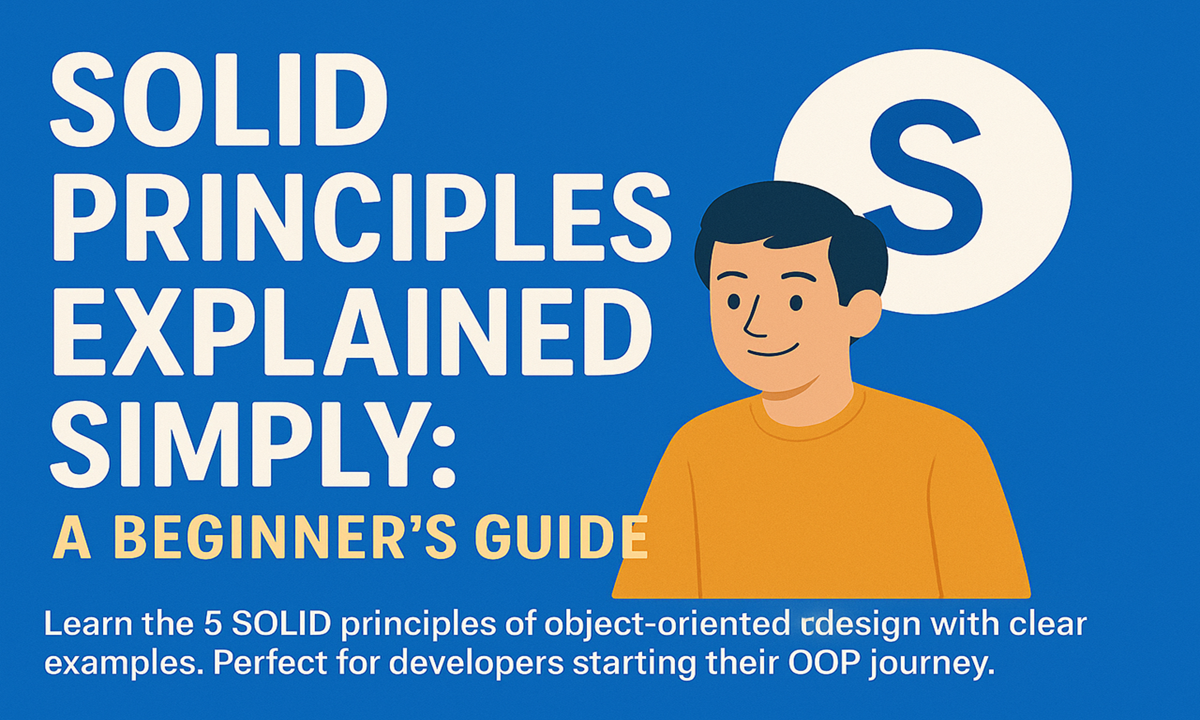Why SOLID Principles Matter
SOLID is an acronym for five fundamental principles that help developers create maintainable, flexible, and scalable software. Originally introduced by Robert C. Martin, these principles have become the gold standard for object-oriented design. Let's break them down with simple examples.
1. Single Responsibility Principle (SRP)
A class should have only one reason to change
Each class should do one thing and do it well.
// ❌ Bad: Class does too much
class User {
saveToDatabase() {...}
sendEmail() {...}
validateData() {...}
}
// ✅ Good: Split responsibilities
class User {
validateData() {...}
}
class UserDatabase {
save(user) {...}
}
class EmailService {
send(user) {...}
}2. Open/Closed Principle (OCP)
Software should be open for extension but closed for modification
Add new functionality without changing existing code.
// ❌ Bad: Modifying existing class
class Logger {
logToFile(message) {...}
// Adding new method:
logToDatabase(message) {...}
}
// ✅ Good: Extend via new classes
interface Logger {
log(message);
}
class FileLogger implements Logger {...}
class DatabaseLogger implements Logger {...}3. Liskov Substitution Principle (LSP)
Subclasses should be substitutable for their parent classes
Child classes shouldn't break parent class behavior.
// ❌ Bad: Square inherits from Rectangle but changes behavior
class Rectangle {
setWidth(w) {...}
setHeight(h) {...}
}
class Square extends Rectangle {
setWidth(w) {
// Also sets height - violates LSP
}
}
// ✅ Better: Separate interfaces
interface Shape {
area();
}
class Rectangle implements Shape {...}
class Square implements Shape {...}4. Interface Segregation Principle (ISP)
Clients shouldn't depend on interfaces they don't use
Create small, specific interfaces instead of large general ones.
// ❌ Bad: One bloated interface
interface Worker {
work();
eat();
sleep();
}
// ✅ Good: Segregated interfaces
interface Workable {
work();
}
interface Eatable {
eat();
}
interface Sleepable {
sleep();
}5. Dependency Inversion Principle (DIP)
Depend on abstractions, not concrete implementations
High-level modules shouldn't depend on low-level details.
// ❌ Bad: Direct dependency
class LightBulb {
turnOn() {...}
}
class Switch {
constructor(bulb) {
this.bulb = bulb;
}
operate() {
this.bulb.turnOn();
}
}
// ✅ Good: Depend on abstraction
interface Switchable {
turnOn();
turnOff();
}
class LightBulb implements Switchable {...}
class Fan implements Switchable {...}
class Switch {
constructor(device) {
this.device = device;
}
operate() {
this.device.turnOn();
}
}SOLID in Practice: Real-World Benefits
- Easier maintenance: Changes affect smaller, isolated parts
- Better testability: Smaller components are easier to test
- Reduced bugs: Clear responsibilities prevent unexpected side effects
- Improved collaboration: Clean interfaces between components
Common SOLID Misconceptions
- SOLID isn't about perfection: It's a guideline, not a religion
- Don't over-engineer: Simple problems may not need SOLID
- Balance is key: Apply principles judiciously
How to Start Using SOLID
- Begin with SRP - easiest to understand and apply
- Practice spotting violations in existing code
- Refactor small portions at a time
- Use SOLID during code reviews
Conclusion: SOLID Foundations for Better Code
SOLID principles help you write code that stands the test of time. While they might seem abstract at first, with practice they'll become second nature. Remember: the goal isn't to follow SOLID perfectly, but to create more maintainable and flexible software.
Exercise: Take a recent piece of code you've written and check how many SOLID principles it follows. Try refactoring one aspect to better align with these principles.
